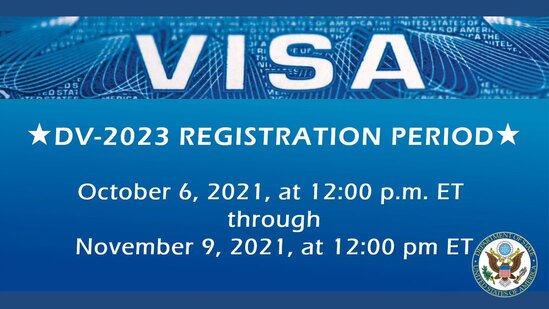Application Deadline: November 9, 2021.
The Department of State annually administers the statutorily created Diversity Immigrant Visa Program. Section 203(c) of the Immigration and Nationality Act (INA) provides for a class of immigrants known as “diversity immigrants” from countries with historically low rates of immigration to the United States. For Fiscal Year 2023, up to 55,000 Diversity Visas (DVs) will be available. There is no cost to register for the DV program.
The congressionally mandated Diversity Visa (DV) Program provides up to 55,000 diversity visas each year, drawn randomly from all applicants who meet the strict eligibility requirements and come from countries with low rates of immigration to the United States.
Applicants who are selected in the program (selectees) must meet simple but strict eligibility requirements to qualify for a DV. The Department of State determines selectees through a randomized computer drawing. The Department of State distributes diversity visas among six geographic regions, and no single country may receive more than seven percent of the available DVs in any one year.
For DV-2023, natives of the following countries are not eligible to apply, because more than 50,000 natives of these countries immigrated to the United States in the previous five years:
Bangladesh, Brazil, Canada, China (including Hong Kong SAR), Colombia, Dominican Republic, El Salvador, Haiti, Honduras, India, Jamaica, Mexico, Nigeria, Pakistan, Philippines, South Korea, United Kingdom (except Northern Ireland) and its dependent territories, Venezuela, and Vietnam.
Natives of Macau SAR and Taiwan are eligible.
Eligibility
Requirement #1: Natives of countries with historically low rates of immigration to the United States may be eligible to enter.
If you are not a native of a country with historically low rates of immigration to the United States, there are two other ways you might be able to qualify.
• Is your spouse a native of a country with historically low rates of immigration to the United States? If yes, you can claim your spouse’s country of birth – provided that you and your spouse are named on the selected entry, are found eligible and issued
diversity visas, and enter the United States at the same time.
• Are you a native of a country that does not have historically low rates of immigration to the United States, but in which neither of your parents was born or legally resident at the time of your birth? If yes, you may claim the country of birth of one of your parents if it is a country whose natives are eligible for the DV-2023 program. For more details on what this means, see the Frequently Asked Questions.
Requirement #2: Each DV applicant must meet the education/work experience requirement of the DV program by having either:
• at least a high school education or its equivalent, defined as successful completion of a 12-year course of formal elementary and secondary education;
OR
• two years of work experience within the past five years in an occupation that requires at least two years of training or experience to perform. The Department of State will use the U.S. Department of Labor’s O*Net Online database to determine qualifying
work experience.
For more information about qualifying work experience, see the Frequently Asked Questions.
You should not submit an entry to the DV program unless you meet both of these requirements.
Entry period
- Applicants must submit entries for the DV-2023 program electronically at dvprogram.state.gov between 12:00 pm (noon), Eastern Daylight Time (EDT) (GMT-4), Wednesday, October 6, 2021, and 12:00 pm (noon), Eastern Standard Time (EST) (GMT5), Tuesday, November 9, 2021.
- Do not wait until the last week of the registration period to enter as heavy demand may result in website delays. No late entries or paper entries will be accepted. The law allows only one entry per person during each entry period.
- The Department of State uses sophisticated technology to detect multiple entries. Submission of more than one entry will render you ineligible for a DV
For More Information:


